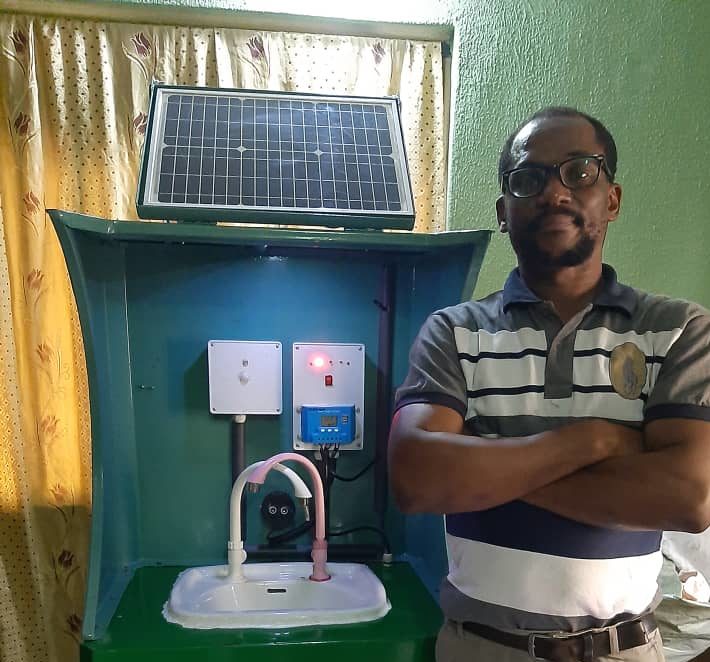Frequent handwashing is among the protective measures required of individuals amidst the Covid-19 pandemic that has spread worldwide. While there are variations on the handwashing machines invented by Africans, they do have something in common: most are designed and built to use solar energy, in order to ensure their smooth and uninterrupted operation on a continent where power supply is intermittent in many places.
Among the African pioneers of automatic solar-powered handwashing machines are Burundian Filston Rukerandanga and four other doctoral research students from various African countries at the Pan African University Institute for Basic Sciences, Technology and Innovation, hosted by the Jomo Kenyatta University of Agriculture and Technology in Nairobi, Kenya.
Other African academicians that have achieved similar feats include Lagos State University Faculty of Engineering Covid-19 Response Team; and a team of engineers from Federal Polytechnic, Oko, both in Nigeria.
On an individual level, Ghana’s Richard Kwarteng has invented a solar-powered handwashing sink fitted with a motion sensor. However, the most eye-catching individual effort is the smart Covid-19 solar-powered automatic mobile handwashing machine invented by Ese Oruade, a young solar entrepreneur and founder/CEO of Sere Integrated Electrics Limited (SIEL) in Lagos, Nigeria’s commercial capital.
The company offers many specialized technology services, ranging from renewable energy (solar PV systems design and installation) to electromechanical (hydraulics and pneumatics) engineering services.
Oruade revealed to pv magazine the inspiration for his invention came during the total lockdown imposed in Nigeria as a result of the emerging Covid-19 pandemic. “I am thankful the machine finally came to fruition,” said the 2008 graduate of Electrical Engineering from the University of Nigeria, Nsukka.
He explained, “After working for about six years, I co-founded a renewable energy company with a university school mate. We got series of deals, mainly with respect to solar PV systems installation, load audit and quotations. Our experience only came from my engineering background and reading up materials from the internet; we also planned to outsource the actual installation works but inexperience (not knowing the fundamentals of solar PV systems and the business) made our efforts ineffective. My colleague later left the country for greener pastures abroad.”
Popular content
The young entrepreneur went on to reveal that his limited knowledge of solar made him enroll at the Renewable Energy Technology Training Institute (RETTI) in Lagos, where he learned, among other things, that not all solar PV systems require the use of inverters; and that DC loads can be powered directly from the charge controller. He said it was after the RETTI training that he established SIEL – a company wholly owned by him and not a partnership like the first one he co-founded with his ex-school mate.
The knowledge he acquired at RETTI was critical in the development of the product he invented: the Smart Covid-19 solar-powered automatic mobile handwashing machine.
It boasts a number of features, including low-power consumption (less than 20W); energy-efficiency (LED lighting only comes on humans coming close to the machine and only operates when it is dark); over current, short-circuit, overload and battery protections (when the battery is fully charged, the machine can operate autonomously for more than two days); zero emissions; and hygiene (the user doesn’t make physical contact with any part of the machine).
Enumerating the benefits of his handwashing machine, Oruade said it will help curtail the spread of Covid-19 in his community and others in Nigeria, pointing out that it is suitable for use in schools, churches, mosques, banks, hospitals, malls, estates, banks, clubs and even outdoor events, etc.
While applauding the efforts of African inventing automated handwashing machines leveraging solar technology, the challenge now is to mass-produce them for sale all over communities in a continent with a lot of sunshine, to help limit the spread of the Covid-19 pandemic.
By Patrick Olisa
This content is protected by copyright and may not be reused. If you want to cooperate with us and would like to reuse some of our content, please contact: editors@pv-magazine.com.


4 comments
By submitting this form you agree to pv magazine using your data for the purposes of publishing your comment.
Your personal data will only be disclosed or otherwise transmitted to third parties for the purposes of spam filtering or if this is necessary for technical maintenance of the website. Any other transfer to third parties will not take place unless this is justified on the basis of applicable data protection regulations or if pv magazine is legally obliged to do so.
You may revoke this consent at any time with effect for the future, in which case your personal data will be deleted immediately. Otherwise, your data will be deleted if pv magazine has processed your request or the purpose of data storage is fulfilled.
Further information on data privacy can be found in our Data Protection Policy.